全新版大学英语综合教程第二册1-6单元A课文翻译及原文-整理最新版名师制作优质教学资料
- 格式:doc
- 大小:139.50 KB
- 文档页数:27
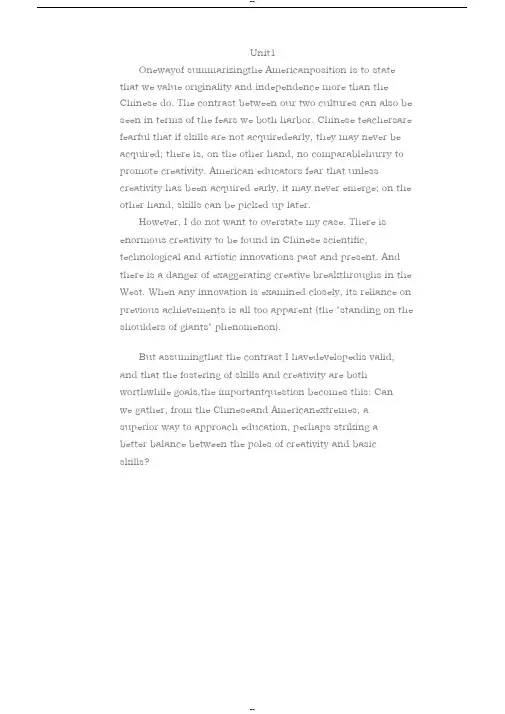
Unit1Onewayof summarizingthe Americanposition is to state that we value originality and independence more than the Chinese do. The contrast between our two cultures can also be seen in terms of the fears we both harbor. Chinese teachersare fearful that if skills are not acquiredearly, they may never be acquired; there is, on the other hand, no comparablehurry to promote creativity. American educators fear that unless creativity has been acquired early, it may never emerge; on the other hand, skills can be picked up later.However, I do not want to overstate my case. There is enormous creativity to be found in Chinese scientific, technological and artistic innovations past and present. And there is a danger of exaggerating creative breakthroughs in the West. When any innovation is examined closely, its reliance on previous achievements is all too apparent (the "standing on the shoulders of giants" phenomenon).But assumingthat the contrast I havedevelopedis valid, and that the fostering of skills and creativity are both worthwhile goals,the importantquestion becomes this: Canwe gather, from the Chineseand Americanextremes, a superior way to approach education, perhaps striking abetter balance between the poles of creativity and basic skills?Unit2Waltonset upa college scholarshipfund for employees' children, a disaster relief fund to rebuild employee homes damagedby fires, floods, tornadoes, and the like. Hebelieved in cultivating ideas and rewarding success."He'd say, 'That fellow worked hard, let's give him alittle extra,'" recalls retired president Ferold F.Arend, whowasstunnedat suchgenerosityafter the stingyemployer he left to join Wal-Mart"I. hadto changemywayof thinking when I came aboard.""Thereasonfor our success,"saysWalton,in a company handout,"is our peopleand theway they'retreated andthe way they feel about their company. They believe things aredifferent here, but they deserve the credit."Adds companylawyer Jim Hendren:"I've never seen anyone yet who worked for him or was around him for any length of time who wasn't better off. And I don't mean just financially, although a lot of people are. It's just something about him -- coming into contact with Sam Walton just makes you a better person."Makingthe journeyfromlog cabin to WhiteHouseis partof the American Dream. But when Jimmy Carter was defeated in his attempt to gain a second term as President of the United States he found himself suddenly thrown out of the WhiteHouseandbackin his log cabin. This is howhe coped.Unit3SEAN:If that sort of thing happenedonly oncein awhile, it wouldn't be so bad. Overall, I wouldn't want totrademy dad for anyone else's. He loves us kids and Mom too. ButI think that's sometimes theproblem.Hewantsto do thingsfor us, things he thinks are good.But he needsto givethem more thought because:SEAN,HEIDIandDIANE:(In unison)Fatherknowsbetter!(The lights quickly fade to black and then come up a second or two later. DIANE stands alone at the Down Right edge of the stage. HEIDI and SEAN enter Down Left and cross to the edge of the stage. )DIANE: Can you imagine how humiliated I was? An honor student, class president. And Father was out asking people to have their sons call and ask me to the prom! But that's dear old dad. Actually, he is a dear. He just doesn't stopto think. And it's not just one of us who've felt the heavyhand of interference. Oh, no, all three of us live in constantdreadknowingthat at anytime disaster canstrike because: Father knows better.Unit4I'd never realized how important daily routine is: dressingfor work, sleepingnormalhours. I'd neverthought I relied so much on co-workers for company. I began to understand why long-term unemployment can be so damaging, whylife without anexternally supporteddaily plan canleadto higher rates of drug abuse, crime, suicide.To restorebalance to mylife, I force myselfback into thereal world. I call people, arrange to meet with the few remaining friends who haven't fled New York City. I try toat least get to the gym,so as to set apart the weekendfromthe rest of my week. I arrange interviews for stories,doctor's appointments-- anythingto get meout of the houseand connected with others.But sometimes being face to face is too much. I see afriend andher ringing laughter is intolerable -- the noise of conversation in the restaurant, unbearable. I make my excuses and flee. I re-enter my apartment and run to the computer as though it were a place of safety.I click on the modem, the once-annoying sound of the connection now as pleasant as my favorite tune. I enter my password. The real world disappears.Thought you were safe sharing secrets with Internet friends? Wait for the doorbell...Unit5The runway felt different this time. It startled him for abrief moment. Then it all hit him like a wet bale of hay.Thebar wasset at nine incheshigher than his personal best. That's only one inch off the National record, he thought.The intensity of the moment filled his mind with anxiety.He began shaking the tension. It wasn't working.He became more tense. Why was this happening to him now, he thought. He began to get nervous. Afraid would be a more accuratedescription. What washe going to do?Hehad never experienced these feelings. Then out of nowhere, and from the deepestdepthsof his soul, he pictured his mother.Why now? What was his mother doing in his thoughts at a time like this? It was simple. His mother always used to tellhim when you felt tense, anxious or even scared, take deep breaths.Sohe did. Alongwith shakingthe tension fromhis legs,he gently laid his pole at his feet. He began to stretchout his arms and upper body. The light breeze that was once there wasnowgone.Hecarefully pickeduphis pole. Hefelthis heart pounding. He was sure the crowd did, too. The silence was deafening. When he heard the singing of some distant birds in flight, he knew it was his time to fly.Unit6Racingthe clock everydayis suchan exhaustingeffortthat when I actually have a few free moments, I tend to collapse. Mostly I sink into a chair and stare into spacewhile I imaginehowlovely life wouldbe if only I possessedthe organizational skills and the energy of my superheroinesIn. fact, I wastea gooddeal of mysparetimejust worrying about what other women are accomplishing in theirs. Sometimes I think that these modern fairy tales create as many problems for women as the old stories that had us biding our time for the day our prince would come.Yet superwomen tales continue to charm me. Despite my friend's warningagainstbeingtakenin, despite everythingI've learned, I find that I'm not only willing, but positively eager to buy that bridge she mentioned. Why? Isupposeit has somethingto do with the appeal of an optimistic approach to life -- and the fact that extraordinary deeds have been accomplished by determined individuals whorefusedto believe that "you can't" wasthe final word on their dreams.Men have generally been assured that achieving their heart's desires wouldbe apiece of cake.Women,of course, have always believed that we can't have our cake and eat it too-the old low-dream diet. Perhaps becominga superwoman is an impossible dream for me, but life without that kind of fantasy is as unappealing as a diet with no treats.1)The young woman described to the policemen the way the man ran up to her and grabbed the bag from her hand.2)All the people working for Sam Walton admire the way he manages Wal-Mart and the way he treats his employees.3)The neighbors were disgusted at the way he talked to hisold father.4)It's amazing the way the eight-year-old boy managed tostay so calm when he faced the emergency.1. You will find yourself penniless in a month.2. He found himself lying in a hospital ward.3. She found herself faced with the toughest job she hadever taken.4. Susan found herself in a trap from which she could not escape.1)Obviously what the speaker wanted to emphasize was the impact of these findings rather than the process that ledto these findings.2)It seemsthat heis neverbotheredaboutwhatpeoplewouldthink about his behavior.3)The CEO never hesitates to let his employees know what he is planning for the company.4)Thescientist will showthe audiencewhata tele-operatedrobot can do for a family.5)Despite all this she manages to get her act together.1、Sheherself believedin freedom,somuchso thatshewould rather die than live without it.2、Assuming the proposal is accepted,where are we going to get the money?3、Only by rewarding success can you bring out the best in your employess.4、It ’s amazing the eight-year-old boy managed to stay so calm when he faced the emergency.5、Allen shouldhaveknown betterthan to lendsucha largesum of money to that untrustworthy cousin of his.。
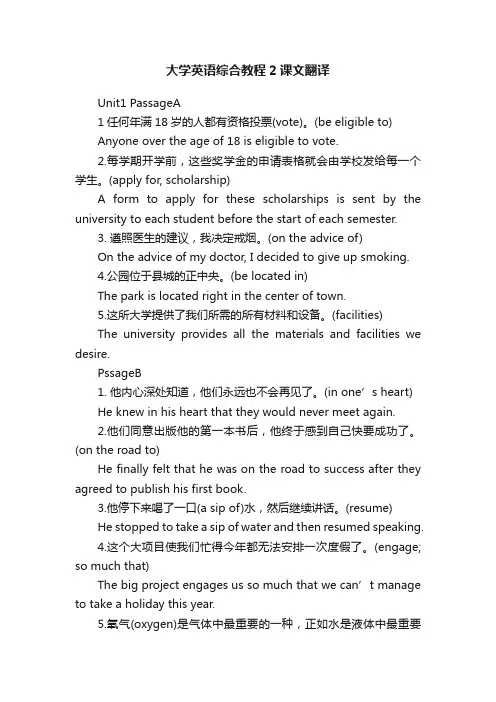
大学英语综合教程2课文翻译Unit1 PassageA1任何年满18岁的人都有资格投票(vote)。
(be eligible to)Anyone over the age of 18 is eligible to vote.2.每学期开学前,这些奖学金的申请表格就会由学校发给每一个学生。
(apply for, scholarship)A form to apply for these scholarships is sent by the university to each student before the start of each semester.3. 遵照医生的建议,我决定戒烟。
(on the advice of)On the advice of my doctor, I decided to give up smoking.4.公园位于县城的正中央。
(be located in)The park is located right in the center of town.5.这所大学提供了我们所需的所有材料和设备。
(facilities)The university provides all the materials and facilities we desire.PssageB1. 他内心深处知道,他们永远也不会再见了。
(in one’s heart)He knew in his heart that they would never meet again.2.他们同意出版他的第一本书后,他终于感到自己快要成功了。
(on the road to)He finally felt that he was on the road to success after they agreed to publish his first book.3.他停下来喝了一口(a sip of)水,然后继续讲话。
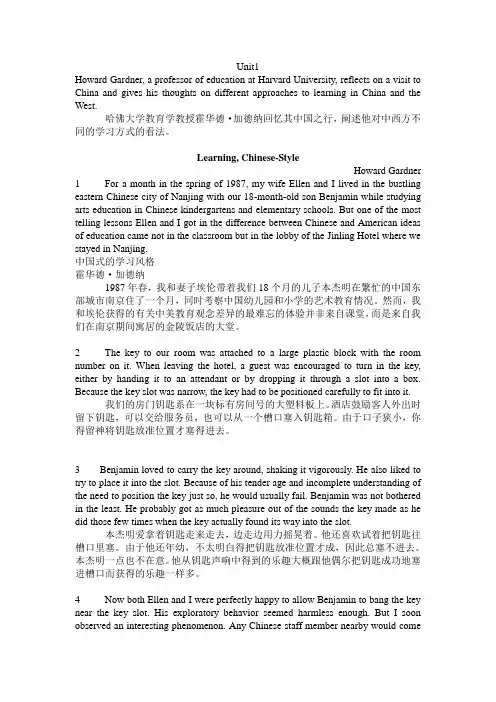
Unit1Howard Gardner, a professor of education at Harvard University, reflects on a visit to China and gives his thoughts on different approaches to learning in China and the West.哈佛大学教育学教授霍华德·加德纳回忆其中国之行,阐述他对中西方不同的学习方式的看法。
Learning, Chinese-StyleHoward Gardner 1 For a month in the spring of 1987, my wife Ellen and I lived in the bustling eastern Chinese city of Nanjing with our 18-month-old son Benjamin while studying arts education in Chinese kindergartens and elementary schools. But one of the most telling lessons Ellen and I got in the difference between Chinese and American ideas of education came not in the classroom but in the lobby of the Jinling Hotel where we stayed in Nanjing.中国式的学习风格霍华德·加德纳1987年春,我和妻子埃伦带着我们18个月的儿子本杰明在繁忙的中国东部城市南京住了一个月,同时考察中国幼儿园和小学的艺术教育情况。
然而,我和埃伦获得的有关中美教育观念差异的最难忘的体验并非来自课堂,而是来自我们在南京期间寓居的金陵饭店的大堂。
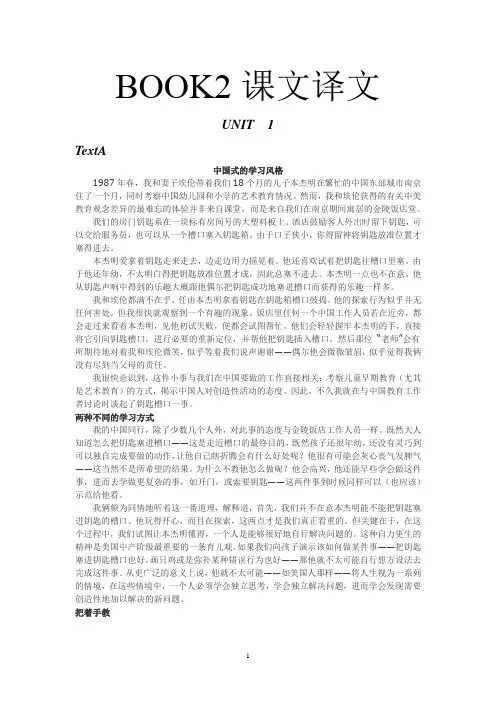
BOOK2课文译文UNIT 1TextA中国式的学习风格1987年春,我和妻子埃伦带着我们18个月的儿子本杰明在繁忙的中国东部城市南京住了一个月,同时考察中国幼儿园和小学的艺术教育情况。
然而,我和埃伦获得的有关中美教育观念差异的最难忘的体验并非来自课堂,而是来自我们在南京期间寓居的金陵饭店堂。
我们的房门钥匙系在一块标有房间号的大塑料板上。
酒店鼓励客人外出时留下钥匙,可以交给服务员,也可以从一个槽口塞入钥匙箱。
由于口子狭小,你得留神将钥匙放准位置才塞得进去。
本杰明爱拿着钥匙走来走去,边走边用力摇晃着。
他还喜欢试着把钥匙往槽口里塞。
由于他还年幼,不太明白得把钥匙放准位置才成,因此总塞不进去。
本杰明一点也不在意。
他从钥匙声响中得到的乐趣大概跟他偶尔把钥匙成功地塞进槽口而获得的乐趣一样多。
我和埃伦都满不在乎,任由本杰明拿着钥匙在钥匙箱槽口鼓捣。
他的探索行为似乎并无任何害处。
但我很快就观察到一个有趣的现象。
饭店里任何一个中国工作人员若在近旁,都会走过来看着本杰明,见他初试失败,便都会试图帮忙。
他们会轻轻握牢本杰明的手,直接将它引向钥匙槽口,进行必要的重新定位,并帮他把钥匙插入槽口。
然后那位“老师”会有所期待地对着我和埃伦微笑,似乎等着我们说声谢谢——偶尔他会微微皱眉,似乎觉得我俩没有尽到当父母的责任。
我很快意识到,这件小事与我们在中国要做的工作直接相关:考察儿童早期教育(尤其是艺术教育)的方式,揭示中国人对创造性活动的态度。
因此,不久我就在与中国教育工作者讨论时谈起了钥匙槽口一事。
两种不同的学习方式我的中国同行,除了少数几个人外,对此事的态度与金陵饭店工作人员一样。
既然大人知道怎么把钥匙塞进槽口——这是走近槽口的最终目的,既然孩子还很年幼,还没有灵巧到可以独自完成要做的动作,让他自己瞎折腾会有什么好处呢?他很有可能会灰心丧气发脾气——这当然不是所希望的结果。
为什么不教他怎么做呢?他会高兴,他还能早些学会做这件事,进而去学做更复杂的事,如开门,或索要钥匙——这两件事到时候同样可以(也应该)示范给他看。
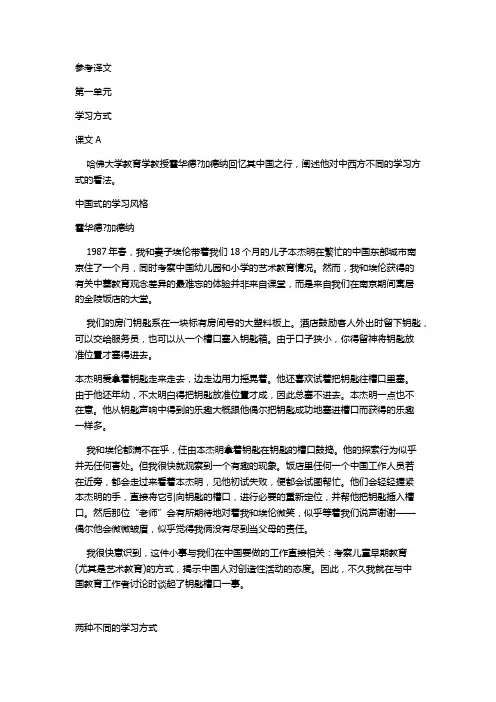
参考译文第一单元学习方式课文A哈佛大学教育学教授霍华德?加德纳回忆其中国之行,阐述他对中西方不同的学习方式的看法。
中国式的学习风格霍华德?加德纳1987年春,我和妻子埃伦带着我们18个月的儿子本杰明在繁忙的中国东部城市南京住了一个月,同时考察中国幼儿园和小学的艺术教育情况。
然而,我和埃伦获得的有关中蓁教育观念差异的最难忘的体验并非来自课堂,而是来自我们在南京期间寓居的金陵饭店的大堂。
我们的房门钥匙系在一块标有房间号的大塑料板上。
酒店鼓励客人外出时留下钥匙,可以交给服务员,也可以从一个槽口塞入钥匙箱。
由于口子狭小,你得留神将钥匙放准位置才塞得进去。
本杰明爱拿着钥匙走来走去,边走边用力摇晃着。
他还喜欢试着把钥匙往槽口里塞。
由于他还年幼,不太明白得把钥匙放准位置才成,因此总塞不进去。
本杰明一点也不在意。
他从钥匙声响中得到的乐趣大概跟他偶尔把钥匙成功地塞进槽口而获得的乐趣一样多。
我和埃伦都满不在乎,任由本杰明拿着钥匙在钥匙的槽口鼓捣。
他的探索行为似乎并无任何害处。
但我很快就观察到一个有趣的现象。
饭店里任何一个中国工作人员若在近旁,都会走过来看着本杰明,见他初试失败,便都会试图帮忙。
他们会轻轻握紧本杰明的手,直接将它引向钥匙的槽口,进行必要的重新定位,并帮他把钥匙插入槽口。
然后那位“老师”会有所期待地对着我和埃伦微笑,似乎等着我们说声谢谢——偶尔他会微微皱眉,似乎觉得我俩没有尽到当父母的责任。
我很快意识到,这件小事与我们在中国要做的工作直接相关:考察儿童早期教育(尤其是艺术教育)的方式,揭示中国人对创造性活动的态度。
因此,不久我就在与中国教育工作者讨论时谈起了钥匙槽口一事。
两种不同的学习方式我的中国同行,除了少数几个人外,对此事的态度与金陵饭店工作人员一样。
”既然大人知道怎么把钥匙塞进槽口——这是处理槽口一事的最终目的,既然孩子还很年幼,还没有灵巧到可以独自完成要做的动作,让他自己瞎折腾会有什么好处呢?他很有可能会灰心丧气发脾气——这当然不是所希望的结果。
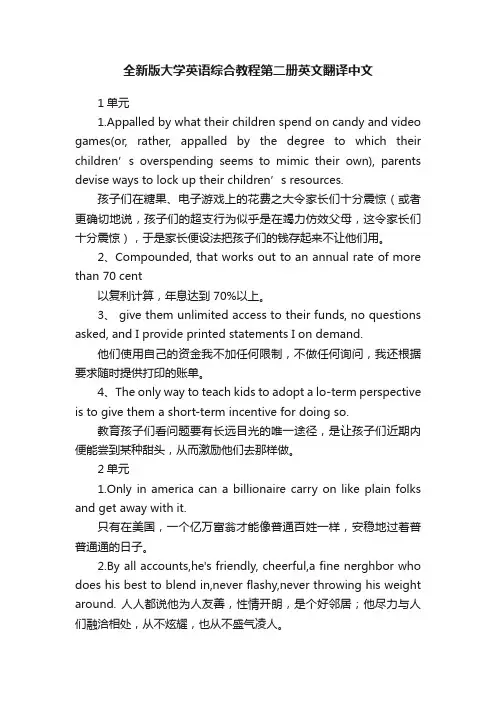
全新版大学英语综合教程第二册英文翻译中文1单元1.Appalled by what their children spend on candy and video games(or, rather, appalled by the degree to which their children’s overspending seems to mimic their own), parents devise ways to lock up their children’s resources.孩子们在糖果、电子游戏上的花费之大令家长们十分震惊(或者更确切地说,孩子们的超支行为似乎是在竭力仿效父母,这令家长们十分震惊),于是家长便设法把孩子们的钱存起来不让他们用。
2、Compounded, that works out to an annual rate of more than 70 cent以复利计算,年息达到 70%以上。
3、 give them unlimited access to their funds, no questions asked, and I provide printed statements I on demand.他们使用自己的资金我不加任何限制,不做任何询问,我还根据要求随时提供打印的账单。
4、The only way to teach kids to adopt a lo-term perspective is to give them a short-term incentive for doing so.教育孩子们看问题要有长远目光的唯一途径,是让孩子们近期内便能尝到某种甜头,从而激励他们去那样做。
2单元1.Only in america can a billionaire carry on like plain folks and get away with it.只有在美国,一个亿万富翁才能像普通百姓一样,安稳地过着普普通通的日子。
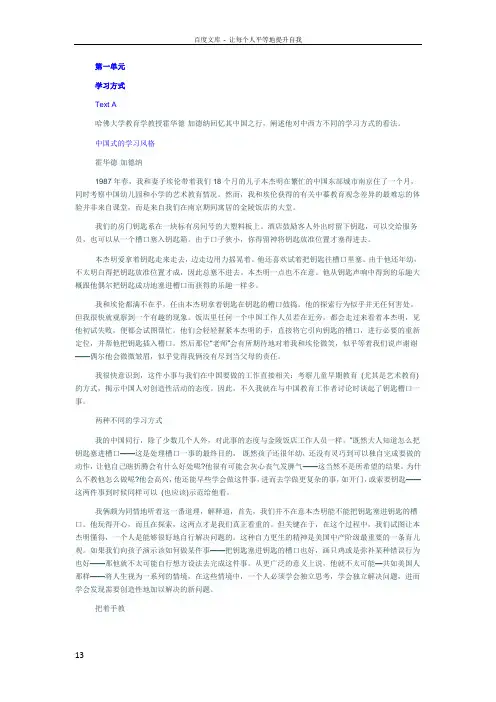
第一单元学习方式Text A哈佛大学教育学教授霍华德·加德纳回忆其中国之行,阐述他对中西方不同的学习方式的看法。
中国式的学习风格霍华德·加德纳1987年春,我和妻子埃伦带着我们18个月的儿子本杰明在繁忙的中国东部城市南京住了一个月,同时考察中国幼儿园和小学的艺术教育情况。
然而,我和埃伦获得的有关中蓁教育观念差异的最难忘的体验并非来自课堂,而是来自我们在南京期间寓居的金陵饭店的大堂。
我们的房门钥匙系在一块标有房间号的大塑料板上。
酒店鼓励客人外出时留下钥匙,可以交给服务员,也可以从一个槽口塞入钥匙箱。
由于口子狭小,你得留神将钥匙放准位置才塞得进去。
本杰明爱拿着钥匙走来走去,边走边用力摇晃着。
他还喜欢试着把钥匙往槽口里塞。
由于他还年幼,不太明白得把钥匙放准位置才成,因此总塞不进去。
本杰明一点也不在意。
他从钥匙声响中得到的乐趣大概跟他偶尔把钥匙成功地塞进槽口而获得的乐趣一样多。
我和埃伦都满不在乎,任由本杰明拿着钥匙在钥匙的槽口鼓捣。
他的探索行为似乎并无任何害处。
但我很快就观察到一个有趣的现象。
饭店里任何一个中国工作人员若在近旁,都会走过来看着本杰明,见他初试失败,便都会试图帮忙。
他们会轻轻握紧本杰明的手,直接将它引向钥匙的槽口,进行必要的重新定位,并帮他把钥匙插入槽口。
然后那位“老师”会有所期待地对着我和埃伦微笑,似乎等着我们说声谢谢——偶尔他会微微皱眉,似乎觉得我俩没有尽到当父母的责任。
我很快意识到,这件小事与我们在中国要做的工作直接相关:考察儿童早期教育(尤其是艺术教育)的方式,揭示中国人对创造性活动的态度。
因此,不久我就在与中国教育工作者讨论时谈起了钥匙槽口一事。
两种不同的学习方式我的中国同行,除了少数几个人外,对此事的态度与金陵饭店工作人员一样。
”既然大人知道怎么把钥匙塞进槽口——这是处理槽口一事的最终目的,既然孩子还很年幼,还没有灵巧到可以独自完成要做的动作,让他自己瞎折腾会有什么好处呢?他很有可能会灰心丧气发脾气——这当然不是所希望的结果。
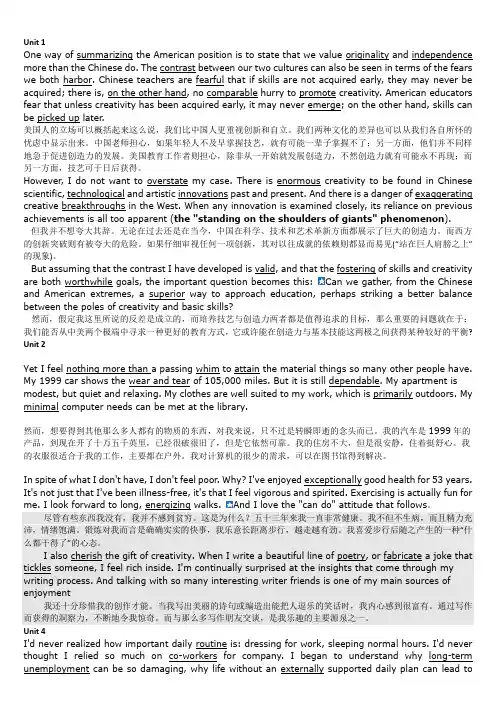
Unit 1One way of summarizing the American position is to state that we value originality and independence more than the Chinese do. The contrast between our two cultures can also be seen in terms of the fears we both harbor. Chinese teachers are fearful that if skills are not acquired early, they may never be acquired; there is, on the other hand, no comparable hurry to promote creativity. American educators fear that unless creativity has been acquired early, it may never emerge; on the other hand, skills can be picked up later.美国人的立场可以概括起来这么说,我们比中国人更重视创新和自立。
我们两种文化的差异也可以从我们各自所怀的忧虑中显示出来。
中国老师担心,如果年轻人不及早掌握技艺,就有可能一辈子掌握不了;另一方面,他们并不同样地急于促进创造力的发展。
美国教育工作者则担心,除非从一开始就发展创造力,不然创造力就有可能永不再现;而另一方面,技艺可于日后获得。
However, I do not want to overstate my case. There is enormous creativity to be found in Chinese scientific, technological and artistic innovations past and present. And there is a danger of exaggerating creative breakthroughs in the West. When any innovation is examined closely, its reliance on previous achievements is all too apparent (the "standing on the shoulders of giants" phenomenon).但我并不想夸大其辞。
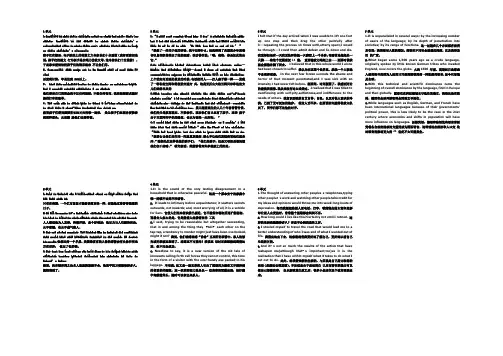
1单元1.Appalled by what their children spend on candy and video games(or, rather, appalled by the degree to which their children’s overspending seems to mimic their own), parents devise ways to lock up their children’s resources.孩子们在糖果、电子游戏上的花费之大令家长们十分震惊(或者更确切地说,孩子们的超支行为似乎是在竭力仿效父母,这令家长们十分震惊),于是家长便设法把孩子们的钱存起来不让他们用。
2、Compounded, that works out to an annual rate of more than 70 cent以复利计算,年息达到 70%以上。
3、 give them unlimited access to their funds, no questions asked, and I provide printed statements I on demand.他们使用自己的资金我不加任何限制,不做任何询问,我还根据要求随时提供打印的账单。
4、The only way to teach kids to adopt a lo-term perspective is to give them a short-term incentive for doing so.教育孩子们看问题要有长远目光的唯一途径,是让孩子们近期内便能尝到某种甜头,从而激励他们去那样做。
2单元1.Only in america can a billionaire carry on like plain folks and get away with it.只有在美国,一个亿万富翁才能像普通百姓一样,安稳地过着普普通通的日子。
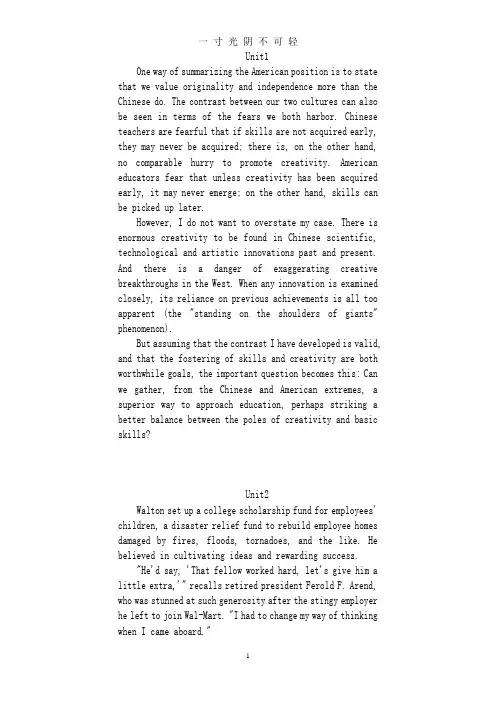
Unit1One way of summarizing the American position is to state that we value originality and independence more than the Chinese do. The contrast between our two cultures can also be seen in terms of the fears we both harbor. Chinese teachers are fearful that if skills are not acquired early, they may never be acquired; there is, on the other hand, no comparable hurry to promote creativity. American educators fear that unless creativity has been acquired early, it may never emerge; on the other hand, skills can be picked up later.However, I do not want to overstate my case. There is enormous creativity to be found in Chinese scientific, technological and artistic innovations past and present. And there is a danger of exaggerating creative breakthroughs in the West. When any innovation is examined closely, its reliance on previous achievements is all too apparent (the "standing on the shoulders of giants" phenomenon).But assuming that the contrast I have developed is valid, and that the fostering of skills and creativity are both worthwhile goals, the important question becomes this: Can we gather, from the Chinese and American extremes, a superior way to approach education, perhaps striking a better balance between the poles of creativity and basic skills?Unit2Walton set up a college scholarship fund for employees' children, a disaster relief fund to rebuild employee homes damaged by fires, floods, tornadoes, and the like. He believed in cultivating ideas and rewarding success."He'd say, 'That fellow worked hard, let's give him a little extra,'" recalls retired president Ferold F. Arend, who was stunned at such generosity after the stingy employer he left to join Wal-Mart. "I had to change my way of thinking when I came aboard.""The reason for our success," says Walton, in a company handout, "is our people and the way they're treated and the way they feel about their company. They believe things are different here, but they deserve the credit."Adds company lawyer Jim Hendren: "I've never seen anyone yet who worked for him or was around him for any length of time who wasn't better off. And I don't mean just financially, although a lot of people are. It's just something about him -- coming into contact with Sam Walton just makes you a better person."Making the journey from log cabin to White House is part of the American Dream. But when Jimmy Carter was defeated in his attempt to gain a second term as President of the United States he found himself suddenly thrown out of the White House and back in his log cabin. This is how he coped.Unit3SEAN: If that sort of thing happened only once in a while, it wouldn't be so bad. Overall, I wouldn't want to trade my dad for anyone else's. He loves us kids and Mom too. But I think that's sometimes the problem. He wants to do things for us, things he thinks are good. But he needs to give them more thought because:SEAN, HEIDI and DIANE: (In unison) Father knows better!(The lights quickly fade to black and then come up a second or two later. DIANE stands alone at the Down Right edge of the stage. HEIDI and SEAN enter Down Left and cross to the edge of the stage. )DIANE: Can you imagine how humiliated I was? An honor student, class president. And Father was out asking people to have their sons call and ask me to the prom! But that's dear old dad. Actually, he is a dear. He just doesn't stop to think. And it's not just one of us who've felt the heavy hand of interference. Oh, no, all three of us live in constant dread knowing that at any time disaster can strike because: Father knows better.Unit4I'd never realized how important daily routine is: dressing for work, sleeping normal hours. I'd never thought I relied so much on co-workers for company. I began to understand why long-term unemployment can be so damaging, why life without an externally supported daily plan can lead to higher rates of drug abuse, crime, suicide.To restore balance to my life, I force myself back into the real world. I call people, arrange to meet with the few remaining friends who haven't fled New York City. I try to at least get to the gym, so as to set apart the weekend from the rest of my week. I arrange interviews for stories, doctor's appointments -- anything to get me out of the house and connected with others.But sometimes being face to face is too much. I see a friend and her ringing laughter is intolerable -- the noise of conversation in the restaurant, unbearable. I make my excuses and flee. I re-enter my apartment and run to the computer as though it were a place of safety.I click on the modem, the once-annoying sound of the connection now as pleasant as my favorite tune. I enter my password. The real world disappears.Thought you were safe sharing secrets with Internet friends? Wait for the doorbell...Unit5The runway felt different this time. It startled him for a brief moment. Then it all hit him like a wet bale of hay. The bar was set at nine inches higher than his personal best. That's only one inch off the National record, he thought. The intensity of the moment filled his mind withanxiety. He began shaking the tension. It wasn't working. He became more tense. Why was this happening to him now, he thought. He began to get nervous. Afraid would be a more accurate description. What was he going to do? He had never experienced these feelings. Then out of nowhere, and from the deepest depths of his soul, he pictured his mother. Why now? What was his mother doing in his thoughts at a time like this? It was simple. His mother always used to tell him when you felt tense, anxious or even scared, take deep breaths.So he did. Along with shaking the tension from his legs, he gently laid his pole at his feet. He began to stretch out his arms and upper body. The light breeze that was once there was now gone. He carefully picked up his pole. He felt his heart pounding. He was sure the crowd did, too. The silence was deafening. When he heard the singing of some distant birds in flight, he knew it was his time to fly.Unit6Racing the clock every day is such an exhausting effort that when I actually have a few free moments, I tend to collapse. Mostly I sink into a chair and stare into space while I imagine how lovely life would be if only I possessed the organizational skills and the energy of my superheroines. In fact, I waste a good deal of my spare time just worrying about what other women are accomplishing in theirs. Sometimes I think that these modern fairy tales create as many problems for women as the old stories that had us biding our time for the day our prince would come.Yet superwomen tales continue to charm me. Despite my friend's warning against being taken in, despite everything I've learned, I find that I'm not only willing, but positively eager to buy that bridge she mentioned. Why? I suppose it has something to do with the appeal of an optimistic approach to life -- and the fact that extraordinary deeds have been accomplished by determinedindividuals who refused to believe that "you can't" was the final word on their dreams.Men have generally been assured that achieving their heart's desires would be a piece of cake. Women, of course, have always believed that we can't have our cake and eat it too-the old low-dream diet. Perhaps becoming a superwoman is an impossible dream for me, but life without that kind of fantasy is as unappealing as a diet with no treats.1) The young woman described to the policemen the way the man ran up to her and grabbed the bag from her hand. 2) All the people working for Sam Walton admire the way he manages Wal-Mart and the way he treats his employees. 3) The neighbors were disgusted at the way he talked to his old father.4) It's amazing the way the eight-year-old boy managed to stay so calm when he faced the emergency.1. You will find yourself penniless in a month.2. He found himself lying in a hospital ward.3. She found herself faced with the toughest job she had ever taken.4. Susan found herself in a trap from which she could not escape.1) Obviously what the speaker wanted to emphasize was the impact of these findings rather than the process that led to these findings.2) It seems that he is never bothered about what people would think about his behavior.3) The CEO never hesitates to let his employees know what he is planning for the company.4) The scientist will show the audience what a tele-operated robot can do for a family.5)Despite all this she manages to get her act together.1、She herself believed in freedom,so much so that she would rather die than live without it.2、Assuming the proposal is accepted,where are we going toget the money?3、Only by rewarding success can you bring out the best in your employess.4、It’s amazing the eight-year-old boy managed to stay so calm when he faced the emergency.5、Allen should have known better than to lend such a large sum of money to that untrustworthy cousin of his.。
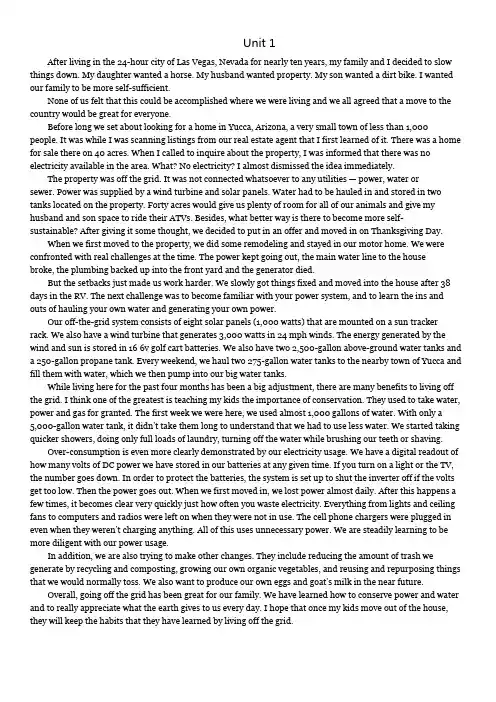
After living in the 24-hour city of Las Vegas, Nevada for nearly ten years, my family and I decided to slow things down. My daughter wanted a horse. My husband wanted property. My son wanted a dirt bike. I wanted our family to be more self-sufficient.None of us felt that this could be accomplished where we were living and we all agreed that a move to the country would be great for everyone.Before long we set about looking for a home in Yucca, Arizona, a very small town of less than 1,000 people. It was while I was scanning listings from our real estate agent that I first learned of it. There was a home for sale there on 40 acres. When I called to inquire about the property, I was informed that there was no electricity available in the area. What? No electricity? I almost dismissed the idea immediately.The property was off the grid. It was not connected whatsoever to any utilities — power, water orsewer. Power was supplied by a wind turbine and solar panels. Water had to be hauled in and stored in two tanks located on the property. Forty acres would give us plenty of room for all of our animals and give my husband and son space to ride their ATVs. Besides, what better way is there to become more self-sustainable? After giving it some thought, we decided to put in an offer and moved in on Thanksgiving Day.When we first moved to the property, we did some remodeling and stayed in our motor home. We were confronted with real challenges at the time. The power kept going out, the main water line to the house broke, the plumbing backed up into the front yard and the generator died.But the setbacks just made us work harder. We slowly got things fixed and moved into the house after 38 days in the RV. The next challenge was to become familiar with your power system, and to learn the ins and outs of hauling your own water and generating your own power.Our off-the-grid system consists of eight solar panels (1,000 watts) that are mounted on a sun tracker rack. We also have a wind turbine that generates 3,000 watts in 24 mph winds. The energy generated by the wind and sun is stored in 16 6v golf cart batteries. We also have two 2,500-gallon above-ground water tanks and a 250-gallon propane tank. Every weekend, we haul two 275-gallon water tanks to the nearby town of Yucca and fill them with water, which we then pump into our big water tanks.While living here for the past four months has been a big adjustment, there are many benefits to living off the grid. I think one of the greatest is teaching my kids the importance of conservation. They used to take water, power and gas for granted. The first week we were here, we used almost 1,000 gallons of water. With only a5,000-gallon water tank, it didn’t take them long to understand that we had to use l ess water. We started taking quicker showers, doing only full loads of laundry, turning off the water while brushing our teeth or shaving.Over-consumption is even more clearly demonstrated by our electricity usage. We have a digital readout of how many volts of DC power we have stored in our batteries at any given time. If you turn on a light or the TV, the number goes down. In order to protect the batteries, the system is set up to shut the inverter off if the volts get too low. Then the power goes out. When we first moved in, we lost power almost daily. After this happens a few times, it becomes clear very quickly just how often you waste electricity. Everything from lights and ceiling fans to computers and radios were left on when they were not in use. The cell phone chargers were plugged in even when they weren’t charging anything. All of this uses unnecessary power. We are steadily learning to be more diligent with our power usage.In addition, we are also trying to make other changes. They include reducing the amount of trash we generate by recycling and composting, growing our own organic vegetables, and reusing and repurposing things that we would normally toss. We also want to produce our own eggs and goat’s milk in the near future.Overall, going off the grid has been great for our family. We have learned how to conserve power and water and to really appreciate what the earth gives to us every day. I hope that once my kids move out of the house, they will keep the habits that they have learned by living off the grid.I received an email from a reader who asked, “Why do some friendships end, no matter how much you want them to last?” She referred to having seen the question in one of my articles, Mystery of Friendship. As I wrote in it, I don’t think easy answers exist as to how friendships start, why some turn into lifetime ones, and why some end. Although I’ve tried answering the first two questions in other articles (To Have A Friend and Be A Friend), I still get surprised by friendships that endure and disillusioned by ones that slip away. Even so, I’ll try to offer some insights here as to why friendships end.My simple answer is that friendships end because the situations friends are in or even the friends themselves change. Others have similar answers. First, the situations friends face may change. The decision to relocate for a new school or job cannot help but affect a friendship. Likewise, if a friend is in an accident, develops an illness, or loses someone close, these situations cannot help but affect a friendship. Does a friendship need to end because of these changes? No, but it’ll require adjustments that one or both friends might not be willing to make. Second, the friends themselves may change. A significant reason that friendships often end when friendsare apart for an extended period of time (for summer camp, college, etc.) is that one or both of the friends change. I think it hurts less when both friends change, because then the breakup is more often mutual and so both friends get closure by both deciding to let go and move forward in their lives without eachother. What tends to hurt most is when just one friend changes. One friend might change social circles, become involved in new social organizations, start to date, get a pet, or take on someother venture that consumes more time and passion. Again, a friendship can endure these changes, unless one or both of the friends for some reason decide not to invest the time and energy involved in the adjustment period. (For example, one friend might forget the importance of the friendship due to the high of having a new pet or might feel that the change is impossible to overcome when one gets married but the other is still single.) In this situation, breakups may not be mutual and so one or both friends feel betrayed and end up with bitter memories about what was a precious friendship to them.There are other reasons why friendships end. For example, as much as two people might want a friendshipto survive, one or both of them might unintentionally neglect it. Friendship is often compared to a flower garden. Well, if flowers don’t get exposed regularly enough to sunlight and don’t get watered enough, flowers will wither and even die. The same applies to friendship. If week after week passes where plans are made to spend time together but are never honored, perhaps due to taking a friendship for granted, eventually even the closest of friendships may cease to have a reason to exist.Conflicts can also cause the end of friendships. If the flower is a fledgling plant, one blow might destroy it just as sometimes relatively young friendships aren’t strong enough to endure much conflict. Even those amazing close friendships, where friends love us no matter what our faults are, need care when it comes to conflicts. Sure, if a flourishing flower gets stepped on, it might revive on its own. Moreover, if it gets a little extra special care, it’ll probably bounce back as if it hadn’t ever been injured. At the same time, if a flower gets repeatedly trampled on, it’ll probably eventually break. Especially the friendships that have been around for a long time can endure storms, and even become stronger for them, but most friendships have breaking points.Nevertheless, while we can rarely predict at the outset which ones will last, most friendships do enrich us for however short or long they’re a part of our lives.In the sleepiness at the end of a library nap, I wasn’t sure where I was. I stretched out my arm to reach for a human being, but what I grabbed was a used copy of The Odyssey, the book about going home. My heart ached.It was 2 a.m. The library, flooded with white fluorescent light and smelling of musty books and sweaty sneakers, was eerily quiet. My readings seemed endless. I had been admitted into a three-course, yearlong freshman program called Directed Studies, dubbed Directed Suicide by Yalies. It was supposed to introduce us to “the splendors of Western civilization,” in the words of the catalog, by force-feeding the canons of philosophy, literature and history.I wanted very much to study the Western canon, because I knew nothing about it. Yes, McDonald’s ads and Madonna posters were plastered on Shanghai streets, but few Western ideas filtered through. We had been informed of Karl Marx’s habit of sitting at the same spot in the British Library, for instance, but had read none of his original words. Western civilization was different, mysterious and thus alluring. Besides, because I longed to be accepted here, I yearned to understand American society. What better way to comprehend it than to study the very ideas on which it is based?But at 2 a.m., I was tired of them all: Homer, Virgil, Herodotus and Plato. Their words were dull and the presentations difficult to follow. The professors here do not teach in the same way that teachers in Chinado. Studying humanities in China means memorizing all the “correct,” standard interpretations given during lectures. Here, professors ask provocative questions and let the students argue, research and write papers on their own. At Yale, I often waited for the end-of-class “correct” answers, which never came.Learning humanities was secure repetition in China, but it was shaky originality here. And it could be even shakier for me. The name Agamemnon was impossibly long to pronounce, and as a result I didn’t recognize it when we were discussing him in the seminars. I had written my first English essay ever just a year earlier, when applying to colleges, and now came the papers analyzing the canons. And I simply didn’t write in English fast enough to take notes in classes.I hoped my diligence would make up for lack of preparation. On weekend nights, when my American roommates were out on dates, I would tell them I had planned a date with Dante or Aristotle. (They didn’t think it was funny.)On one of those weekend nights, I wrote a paper on Aeneas, the protagonist of The Aeneid, who was destined to found Rome but reluctant to leave behind his native Troy. “Aeneas agonizes,” Iwrote. “He hesitates. Natural instincts call him to stick to the past, while at the same time, he feels obligatedto obey his father’s instructions for the future. His present life is split, pulled apart by the bygone days and by the days to come. ” I saw myself in what I wrote.During calls home every two weeks, my mother pleaded with me to take chemistry or biology. Science was the same everywhere, she said. And I, like everybody else from China, was well prepared in math, physics and chemistry. (To graduate from a standard six-year Chinese high school, one needs to take five years of physics, four years of chemistry and three years of biology.)Instead, I visited the writing tutor — there is one in every undergraduate residential hall — for every paper I turned in. My papers were always written days before they were due. I lingered after classes to question professors. My classmates lent me their notes so I could learn the skill of note-taking in English.By the time I missed home so much that soup dumplings and sautéed eels popped up in my head as I read, Nietzsche had replaced Plato on the chronological reading list and Flaubert Homer. And every paper of mine came back with an A.脱离电网的生活:一家城市居民如何发现了简单生活艾莉森·佐谢尔1.在内华达州的不眠之城拉斯维加斯生活了将近十年之后,我和我的家人决定放慢生活节奏。
全新版大学英语第二版综合教程2课文译文课文译文UNIT1Te某tA中国式的学习风格1987年春,我和妻子埃伦带着我们18个月的儿子本杰明在繁忙的中国东部城市南京住了一个月,同时考察中国幼儿园和小学的艺术教育情况。
然而,我和埃伦获得的有关中美教育观念差异的最难忘的体验并非来自课堂,而是来自我们在南京期间寓居的金陵饭店堂。
我们的房门钥匙系在一块标有房间号的大塑料板上。
酒店鼓励客人外出时留下钥匙,可以交给服务员,也可以从一个槽口塞入钥匙箱。
由于口子狭小,你得留神将钥匙放准位置才塞得进去。
本杰明爱拿着钥匙走来走去,边走边用力摇晃着。
他还喜欢试着把钥匙往槽口里塞。
由于他还年幼,不太明白得把钥匙放准位置才成,因此总塞不进去。
本杰明一点也不在意。
他从钥匙声响中得到的乐趣大概跟他偶尔把钥匙成功地塞进槽口而获得的乐趣一样多。
我和埃伦都满不在乎,任由本杰明拿着钥匙在钥匙箱槽口鼓捣。
他的探索行为似乎并无任何害处。
但我很快就观察到一个有趣的现象。
饭店里任何一个中国工作人员若在近旁,都会走过来看着本杰明,见他初试失败,便都会试图帮忙。
他们会轻轻握牢本杰明的手,直接将它引向钥匙槽口,进行必要的重新定位,并帮他把钥匙插入槽口。
然后那位“老师”会有所期待地对着我和埃伦微笑,似乎等着我们说声谢谢——偶尔他会微微皱眉,似乎觉得我俩没有尽到当父母的责任。
我的中国同行,除了少数几个人外,对此事的态度与金陵饭店工作人员一样。
既然大人知道怎么把钥匙塞进槽口——这是走近槽口的最终目的,既然孩子还很年幼,还没有灵巧到可以独自完成要做的动作,让他自己瞎折腾会有什么好处呢?他很有可能会灰心丧气发脾气——这当然不是所希望的结果。
为什么不教他怎么做呢?他会高兴,他还能早些学会做这件事,进而去学做更复杂的事,如开门,或索要钥匙——这两件事到时候同样可以(也应该)示范给他看。
我俩颇为同情地听着这一番道理,解释道,首先,我们并不在意本杰明能不能把钥匙塞进钥匙的槽口。
Unit 1Text AHoward Gardner, a professor of education at Harvard University, reflects on a visit to China and gives his thoughts on different approaches to learning in China and the West.哈佛大学教育学教授霍华德·加德纳回忆其中国之行,阐述他对中西方不同的学习方式的看法。
Learning, Chinese-StyleHoward Gardner 1 For a month in the spring of 1987, my wife Ellen and I lived in the bustling eastern Chinese city of Nanjing with our 18-month-old son Benjamin while studying arts education in Chinese kindergartens and elementary schools. But one of the most telling lessons Ellen and I got in the difference between Chinese and American ideas of education came not in the classroom but in the lobby of the Jinling Hotel where we stayed in Nanjing.中国式的学习风格霍华德·加德纳1987年春,我和妻子埃伦带着我们18个月的儿子本杰明在繁忙的中国东部城市南京住了一个月,同时考察中国幼儿园和小学的艺术教育情况。
然而,我和埃伦获得的有关中美教育观念差异的最难忘的体验并非来自课堂,而是来自我们在南京期间寓居的金陵饭店的大堂。
全新版大学英语第二版综合教程2课文翻译《全新版大学英语第二版综合教程 2》中的课文涵盖了丰富多样的主题和内容,为学习者提供了广泛的语言输入和文化视角。
以下是对部分课文的翻译,希望能对您的学习有所帮助。
课文一:《成长》这篇课文讲述了一个年轻人在成长过程中的经历和感悟。
“当我还是个孩子的时候,世界似乎总是充满了奇迹和神秘。
每一天都是一次新的冒险,每一个角落都隐藏着未知的惊喜。
”“随着年龄的增长,我开始意识到生活并非总是如我所愿。
困难和挫折接踵而至,曾经的梦想似乎变得遥不可及。
”“然而,正是在这些艰难的时刻,我学会了坚持和努力。
我明白了成功并非一蹴而就,而是需要付出持续不断的努力。
”“成长让我懂得了珍惜身边的人和事,也让我更加勇敢地面对未来的挑战。
”课文二:《友谊》“真正的友谊是一种珍贵的财富,它能在我们最需要的时候给予支持和安慰。
”“朋友是那些在你犯错时,不会嘲笑你,而是帮助你改正错误的人。
他们会在你成功时为你欢呼,在你失败时给你鼓励。
”“友谊不是建立在利益和交换之上,而是基于真诚、信任和相互理解。
一个真正的朋友会倾听你的心声,与你分享快乐和悲伤。
”“在这个快节奏的现代社会中,我们常常忙于工作和生活,忽略了与朋友的联系。
但当我们回首往事,会发现真正的友谊是那些经得起时间考验的情感纽带。
”课文三:《文化差异》“不同的国家和民族有着独特的文化,这些文化差异在日常生活的方方面面都有所体现。
”“饮食文化就是一个明显的例子。
在中国,人们喜欢围坐在一张大桌子旁共享美食;而在西方国家,分餐制更为常见。
”“礼仪方面的差异也不容忽视。
在某些文化中,直接的眼神接触被视为尊重;而在另一些文化中,可能会被认为是不礼貌的。
”“理解和尊重文化差异是促进跨文化交流和建立和谐世界的关键。
只有当我们摒弃偏见,以开放的心态去学习和欣赏其他文化时,才能真正实现文化的交融与共同发展。
”课文四:《科技与生活》“科技的飞速发展给我们的生活带来了翻天覆地的变化。
全新版大学英语第二版综合教程2课文及翻译全新版大学英语第二版综合教程 2 是许多大学生在英语学习道路上的重要教材。
这本教程的课文涵盖了丰富多样的主题,从日常生活到学术研究,从文化传统到社会现象,为学生提供了广阔的知识视野和语言学习素材。
在“Unit 1 Ways of Learning”中,课文通过讲述一位父亲试图教导儿子骑自行车的经历,探讨了不同的学习方式和理念。
父亲坚持按照自己的方法指导儿子,却未能成功。
最终儿子通过自己的摸索和尝试,掌握了骑车的技巧。
这篇课文让我们明白,每个人都有适合自己的学习方式,有时候放手让学习者自己去探索和尝试,可能会取得更好的效果。
“Unit 2 Values”里的课文则聚焦于价值观的讨论。
通过描述不同人物在面对利益和道德抉择时的表现,引导学生思考什么是真正重要的价值观。
例如,在商业世界中,是追求短期的利润最大化,还是坚守诚信和社会责任?这样的思考有助于学生在成长过程中树立正确的价值观,做出符合自己内心信念的选择。
“Unit 3 The Generation Gap”探讨了代际之间的差异和沟通问题。
课文中描绘了父母与子女在观念、生活方式和目标追求上的种种不同,以及由此产生的矛盾和冲突。
然而,也指出了通过理解、尊重和积极的沟通,代际之间可以跨越鸿沟,建立更加和谐的关系。
在翻译这些课文时,需要准确把握原文的意思,同时要考虑到中英文语言习惯和文化背景的差异。
例如,在一些具有特定文化内涵的词汇和表达上,不能简单地进行字面翻译,而要进行适当的解释和转换,以使译文更符合目标语言的读者的理解。
以“Unit 4 The Virtual World”中的一段为例:“The Internet has transformed how we communicate, do business, and access information Ithas opened up a world of possibilities, but it has also brought along new challenges and concerns” 翻译为“互联网改变了我们交流、做生意和获取信息的方式。
Unit1Howard Gardner, a professor of education at Harvard University, reflects on a visit to China and gives his thoughts on different approaches to learning in China and the West.哈佛大学教育学教授霍华德·加德纳回忆其中国之行,阐述他对中西方不同的学习方式的看法。
Learning, Chinese-StyleHoward Gardner 1 For a month in the spring of 1987, my wife Ellen and I lived in the bustling eastern Chinese city of Nanjing with our 18-month-old son Benjamin while studying arts education in Chinese kindergartens and elementary schools. But one of the most telling lessons Ellen and I gotin the difference between Chinese and American ideas of education came not in the classroom butin the lobby of the Jinling Hotel where we stayed in Nanjing.中国式的学习风格霍华德·加德纳1987年春,我和妻子埃伦带着我们18个月的儿子本杰明在繁忙的中国东部城市南京住了一个月,同时考察中国幼儿园和小学的艺术教育情况。
然而,我和埃伦获得的有关中美教育观念差异的最难忘的体验并非来自课堂,而是来自我们在南京期间寓居的金陵饭店的大堂。
Unit1One way of summarizing the American position is to state that we value originality and independence more than the Chinese do. The contrast between our two cultures can also be seen in terms of the fears we both harbor. Chinese teachers are fearful that if skills are not acquired early, they may never be acquired; there is, on the other hand, no comparable hurry to promote creativity. American educators fear that unless creativity has been acquired early, it may never emerge; on the other hand, skills can be picked up later.However, I do not want to overstate my case. There is enormous creativity to be found in Chinese scientific, technological and artistic innovations past and present. And there is a danger of exaggerating creative breakthroughs in the West. When any innovation is examined closely, its reliance on previous achievements is all too apparent (the "standing on the shoulders of giants" phenomenon).But assuming that the contrast I have developed is valid, and that the fostering of skills and creativity are both worthwhile goals, the important question becomes this: Can we gather, from the Chinese and American extremes, a superior way to approach education, perhaps striking a better balance between the poles of creativity and basic skills?Unit2Walton set up a college scholarship fund for employees' children, a disaster relief fund to rebuild employee homes damaged by fires, floods, tornadoes, and the like. He believed in cultivating ideas and rewarding success."He'd say, 'That fellow worked hard, let's give him a little extra,'" recalls retired president Ferold F. Arend, who was stunned at such generosity after the stingy employer he left to join Wal-Mart. "I had to change my way of thinking when I came aboard.""The reason for our success," says Walton, in a company handout, "is our people and the way they're treated and the way they feel about their company. They believe things are different here, but they deserve the credit."Adds company lawyer Jim Hendren: "I've never seen anyone yet who worked for him or was around him for any length of time who wasn't better off. And I don't mean just financially, although a lot of people are. It's just something about him -- coming into contact with Sam Walton just makes you a better person."Making the journey from log cabin to White House is part of the American Dream. But when Jimmy Carter was defeated in his attempt to gain a second term as President of the United States he found himself suddenly thrown out of the White House and back in his log cabin. This is how he coped.Unit3SEAN: If that sort of thing happened only once in a while, it wouldn't be so bad. Overall, I wouldn't want to trade my dad for anyone else's. He loves us kids and Mom too. But I think that's sometimes the problem. He wants to do things for us, things he thinks are good. But he needs to give them more thought because:SEAN, HEIDI and DIANE: (In unison) Father knows better!(The lights quickly fade to black and then come up a second or two later. DIANE stands alone at the Down Right edge of the stage. HEIDI and SEAN enter Down Left and cross to the edge of the stage. )DIANE: Can you imagine how humiliated I was? An honor student, class president. And Father was out asking people to have their sons call and ask me to the prom! But that's dear old dad. Actually, he is a dear. He just doesn't stop to think. And it's not just one of us who've felt the heavy hand of interference. Oh, no, all three of us live in constant dread knowing that at any time disaster can strike because: Father knows better.Unit4I'd never realized how important daily routine is: dressing for work, sleeping normal hours. I'd never thought I relied so much on co-workers for company. I began to understand why long-term unemployment can be so damaging, why life without an externally supported daily plan can lead to higher rates of drug abuse, crime, suicide.To restore balance to my life, I force myself back into the real world. I call people, arrange to meet with the few remaining friends who haven't fled New York City. I try to at least get to the gym, so as to set apart the weekend from the rest of my week. I arrange interviews for stories, doctor's appointments -- anything to get me out of the house and connected with others.But sometimes being face to face is too much. I see a friend and her ringing laughter is intolerable -- the noise of conversation in the restaurant, unbearable. I make my excuses and flee. I re-enter my apartment and run to the computer as though it were a place of safety.I click on the modem, the once-annoying sound of the connection now as pleasant as my favorite tune. I enter my password. The real world disappears.Thought you were safe sharing secrets with Internet friends? Wait for the doorbell...Unit5The runway felt different this time. It startled him for a brief moment. Then it all hit him like a wet bale of hay. The bar was set at nine inches higher than his personal best. That's only one inch off the National record, he thought. The intensity of the moment filled his mind with anxiety. He began shaking the tension. It wasn't working. He became more tense. Why was this happening to him now, he thought. He began to get nervous. Afraid would be a more accurate description. What was he going to do? He had never experienced these feelings. Then out of nowhere, and from the deepest depths of his soul, he pictured his mother. Why now? What was his mother doing in his thoughts at a time like this? It was simple. His mother always used to tell him when you felt tense, anxious or even scared, take deep breaths.So he did. Along with shaking the tension from his legs, he gently laid his pole at his feet. He began to stretch out his arms and upper body. The light breeze that was once there was now gone. He carefully picked up his pole. He felt his heart pounding. He was sure the crowd did, too. The silence was deafening. When he heard the singing of some distant birds in flight, he knew it was his time to fly.Unit6Racing the clock every day is such an exhausting effort that when I actually have a few free moments, I tend to collapse. Mostly I sink into a chair and stare into space while I imagine how lovely life would be if only I possessed the organizational skills and the energy of my superheroines. In fact, I waste a good deal of my spare time just worrying about what other women are accomplishing in theirs. Sometimes I think that these modern fairy tales create as many problems for women as the old stories that had us biding our time for the day our prince would come.Yet superwomen tales continue to charm me. Despite my friend's warning against being taken in, despite everything I've learned, I find that I'm not only willing, but positively eager to buy that bridge she mentioned. Why? I suppose it has something to do with the appeal of an optimistic approach to life -- and the fact that extraordinary deeds have been accomplished by determined individuals who refused to believe that "you can't" was the final word on their dreams.Men have generally been assured that achieving their heart's desires would be a piece of cake. Women, of course, have always believed that we can't have our cake and eat it too-the old low-dream diet. Perhaps becoming a superwoman is an impossible dream for me, but life without that kind of fantasy is as unappealing as a diet with no treats.1) The young woman described to the policemen the way the man ran up to her and grabbed the bag from her hand. 2) All the people working for Sam Walton admire the way he manages Wal-Mart and the way he treats his employees. 3) The neighbors were disgusted at the way he talked to his old father.4) It's amazing the way the eight-year-old boy managed to stay so calm when he faced the emergency.1. You will find yourself penniless in a month.2. He found himself lying in a hospital ward.3. She found herself faced with the toughest job she had ever taken.4. Susan found herself in a trap from which she could not escape.1) Obviously what the speaker wanted to emphasize was the impact of these findings rather than the process that led to these findings.2) It seems that he is never bothered about what people would think about his behavior.3) The CEO never hesitates to let his employees know what he is planning for the company.4) The scientist will show the audience what a tele-operated robot can do for a family.5)Despite all this she manages to get her act together.1、She herself believed in freedom,so much so that she would rather die than live without it.2、Assuming the proposal is accepted,where are we going to get the money?3、Only by rewarding success can you bring out the best in your employess.4、It’s amazing the eight-year-old boy managed to stay so calm when he faced the emergency.5、Allen should have known better than to lend such a large。
Unit1 A Learning, Chinese-StyleUnit2 A A Life Full of RichesUnit3 A Father Knows BetterUnit4 A A Virtual LifeUnit5 A True HeightUnit6 A A Woman Can Learn Anything a Man CanUnit1Howard Gardner, a professor of education at Harvard University, reflects on a visit to China and gives his thoughts on different approaches to learning in China and the West.哈佛大学教育学教授霍华德·加德纳回忆其中国之行,阐述他对中西方不同的学习方式的看法。
Learning, Chinese-StyleHoward Gardner 1 For a month in the spring of 1987, my wife Ellen and I lived in the bustling eastern Chinese city of Nanjing with our 18-month-old son Benjamin while studying arts education in Chinese kindergartens and elementary schools. But one of the most telling lessons Ellen and I got in the difference between Chinese and American ideas of education came not in the classroom but in the lobby of the Jinling Hotel where we stayed in Nanjing.中国式的学习风格霍华德·加德纳1987年春,我和妻子埃伦带着我们18个月的儿子本杰明在繁忙的中国东部城市南京住了一个月,同时考察中国幼儿园和小学的艺术教育情况。
然而,我和埃伦获得的有关中美教育观念差异的最难忘的体验并非来自课堂,而是来自我们在南京期间寓居的金陵饭店的大堂。
2 The key to our room was attached to a large plastic block with the room number on it. When leaving the hotel, a guest was encouraged to turn in the key, either by handing it to an attendant or by dropping it through a slot into a box. Because the key slot was narrow, the key had to be positioned carefully to fit into it.我们的房门钥匙系在一块标有房间号的大塑料板上。
酒店鼓励客人外出时留下钥匙,可以交给服务员,也可以从一个槽口塞入钥匙箱。
由于口子狭小,你得留神将钥匙放准位置才塞得进去。
3 Benjamin loved to carry the key around, shaking it vigorously. He also liked to try to place it into the slot. Because of his tender age and incomplete understanding of the need to position the key just so, he would usually fail. Benjamin was not bothered in the least. He probably got as much pleasure out of the sounds the key made as he did those few times when the key actually found its way into the slot.本杰明爱拿着钥匙走来走去,边走边用力摇晃着。
他还喜欢试着把钥匙往槽口里塞。
由于他还年幼,不太明白得把钥匙放准位置才成,因此总塞不进去。
本杰明一点也不在意。
他从钥匙声响中得到的乐趣大概跟他偶尔把钥匙成功地塞进槽口而获得的乐趣一样多。
4 Now both Ellen and I were perfectly happy to allow Benjamin to bang the key near the key slot. His exploratory behavior seemed harmless enough. But I soon observed an interesting phenomenon. Any Chinese staff member nearby would come over to watch Benjamin and, noting his lack of initial success, attempt to assist. He or she would hold onto Benjamin's hand and, gently but firmly, guide it directly toward the slot, reposition it as necessary, and help him to insert it. The "teacher" would then smile somewhat expectantly at Ellen or me, as if awaiting a thank you ─and on occasion would frown slightly, as if considering us to be neglecting our parental duties.我和埃伦都满不在乎,任由本杰明拿着钥匙在钥匙的槽口鼓捣。
他的探索行为似乎并无任何害处。
但我很快就观察到一个有趣的现象。
饭店里任何一个中国工作人员若在近旁,都会走过来看着本杰明,见他初试失败,便都会试图帮忙。
他们会轻轻握紧本杰明的手,直接将它引向钥匙的槽口,进行必要的重新定位,并帮他把钥匙插入槽口。
然后那位“老师”会有所期待地对着我和埃伦微笑,似乎等着我们说声谢谢——偶尔他会微微皱眉,似乎觉得我俩没有尽到当父母的责任。
5 I soon realized that this incident was directly relevant to our assigned tasks in China: to investigate the ways of early childhood education (especially in the arts), and to throw light on Chinese attitudes toward creativity. And so before long I began to introduce the key-slot anecdote into my discussions with Chinese educators. 我很快意识到,这件小事与我们在中国要做的工作直接相关:考察儿童早期教育(尤其是艺术教育)的方式,揭示中国人对创造性活动的态度。
因此,不久我就在与中国教育工作者讨论时谈起了钥匙槽口一事。
TWO DIFFERENT WAYS TO LEARN6 With a few exceptions my Chinese colleagues displayed the same attitude as the staff at the Jinling Hotel. Since adults know how to place the key in the key slot, which is the ultimate purpose of approaching the slot, and since the child is neither old enough nor clever enough to realize the desired action on his own, what possible gain is achieved by having him struggle? He may well get frustrated and angry ─certainly not a desirable outcome. Why not show him what to do? He will be happy, he will learn how to accomplish the task sooner, and then he can proceed to more complex activities, like opening the door or asking for the key ─both of which accomplishments can (and should) in due course be modeled for him as well.两种不同的学习方式我的中国同行,除了少数几个人外,对此事的态度与金陵饭店工作人员一样。
既然大人知道怎么把钥匙塞进槽口——这是处理槽口一事的最终目的,既然孩子还很年幼,还没有灵巧到可以独自完成要做的动作,让他自己瞎折腾会有什么好处呢?他很有可能会灰心丧气发脾气——这当然不是所希望的结果。
为什么不教他怎么做呢?他会高兴,他还能早些学会做这件事,进而去学做更复杂的事,如开门,或索要钥匙——这两件事到时候同样可以(也应该)示范给他看。
7 We listened to such explanations sympathetically and explained that, first of all, we did not much care whether Benjamin succeeded in inserting the key into the slot. He was having a good time and was exploring, two activities that did matter to us. But the critical point was that, in the process, we were trying to teach Benjamin that one can solve a problem effectively by oneself. Such self-reliance is a principal value of child rearing in middle-class America. So long as the child is shown exactly how to do something ─whether it be placing a key in a key slot, drawing a hen or making up for a misdeed ─he is less likely to figure out himself how to accomplish such a task. And, more generally, he is less likely to view life ─as Americans do ─as a series of situations in which one has to learn to think for oneself, to solve problems on one's own and even to discover new problems for which creative solutions are wanted.我俩颇为同情地听着这一番道理,解释道,首先,我们并不在意本杰明能不能把钥匙塞进钥匙的槽口。